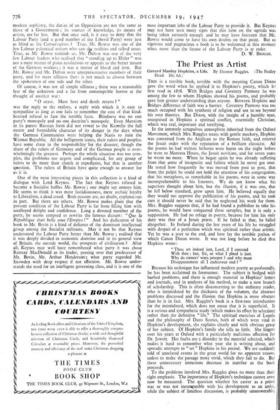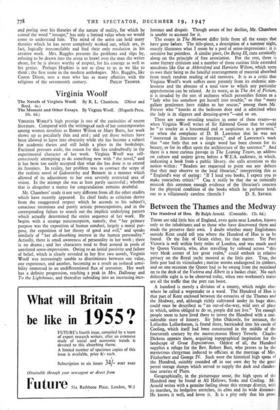The Priest as Artist
THIS is a terrible book, terrible with the meaning Canon Dixon gave the word when he applied it to Hopkins's poetry, which 11° first read in 1878. With Bridges and Coventry Patmore he was among the few to whom Hopkins showed his poems, and probably gave him greater understanding than anyone. Between Hopkins and Bridges difference of faith was a barrier. Coventry Patmore was too much occupied with his synthesis of religion and sex to see beyond his own theories. But Dixon, with the insight of g humble man, recognised in HopkinS a spiritual conflict, essentially Christian, which was real, important and terrifying.
In the intensely scrupulous atmosphere inherited from the Oxford Movement, which Mrs. Ruggles treats with gentle mockery, Hopkins was converted from the Anglican to the Roman faith, and entered the Jesuit order with the reputation of a brilliant classicist. All the poems he had written hitherto were burnt on the night before he went to Manresa House, the Jesuit novitiate, and for seven years he wrote no more. When he began again he was already suffering from that sense of incapacity and failure which he never got over. He noted how frequently he was moved from post to post, that from the pulpit he could not hold the attention of his congregation, that his metaphors, so remarkable in his poems, were in some way incomprehensible to his listeners. We do not know what his superiors thought about him, but the illusion, if it was one, that he fell below standard, grew upon him. He believed equally that they would not approve the publication of his poems, and he took care it should never be said that he neglected his work for them. Mrs. Ruggles suggests that, if he had found a publisher to take his poems, he would have -conquered these scruples, but it is only a supposition. He had no refuge in poetry, because for him his only duty was that of a Jesuit priest. If he failed at that, he failed altogether. In Ireland during the last years of his life he struggled with despair of a perfection which was spiritual rather than artistic. Yet he was a poet to the end, and here lay the terrible pathos of which Canon Dixon wrote. It was not long before he died that Hopkins wrote:
" Thou art indeed just, Lord, if I contend With thee ; but, Sir, so what I plead is just. Why do sinners' ways prosper ? and why must Disappointment all I endeavour end ? "
Because his technique has influenced modern poetry so profoundly, he has been acclaimed its forerunner. The subject is hedged with barbed problems, and there is enough material in Hopkins' letters and journals, and in analyses of his method, to make a new branch of scholarship. This is often disconcerting to the ordinary reader, who is intimidated by the thickness of the volumes, the abstruse problems discussed and the illusion that Hopkins is more obscure than he is in fact. Mrs. Ruggles's book is a first-rate introduction for the intimidated, which does not mean that it is superficial. It is a serious and sympathetic study (which makes its effect by selection) rather than the definitive " life." The spiritual exercises of Loyola and the philosophy of Duns Scotus, both of which were vital in Hopkins's development, she explains clearly and with obvious grasp of her subject. Of Hopkins's family she tells us little. She lingers over his years at Oxford with a particularly malicious affection for Dr. Jowett. Her faults are a disorder in the material selected, which makes it hard to remember what year she is writing about, and sporadic attempts to " set " Hopkins in his period. We are suddenly told of unrelated events in the great world for no apparent reason, unless to make the passage more vivid, which they fail to do. But these unnecessary intcusions decrease in number as the book proceeds. To the problems involved Mrs. Ruggles gives no more than their right emphasis. The importance of Hopkins's technique cannot even now be measured. The question whether his career as a priest was or was not incompatible with his development as an artist, while the subject of limitless discussion, is probably unanswerable, and poring over his theories of the nature of reality, for which he coined the word " inscape," has only a limited value when we would come to understand him. The mind of the artist can hold many theories which he has never completely worked out, which are, in fact, logically irreconcilable and find their only resolution in his creative work. Mrs. Ruggles presents the problems and slips by, refusing to be drawn into the arena to brawl over the man she writes about, for he is always worthy of respect, for his courage as well as his genius. Perhaps Hopkins is not as close to us as we like to think ; the first name in the modern anthologies. Mrs. Ruggles, like Canon Dixon, sees a man who has as many affinities with the religious of the seventeenth century. PHILIP TROWER. .



































 Previous page
Previous page